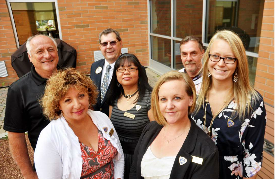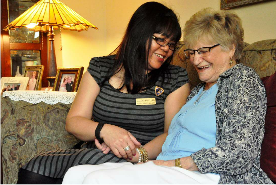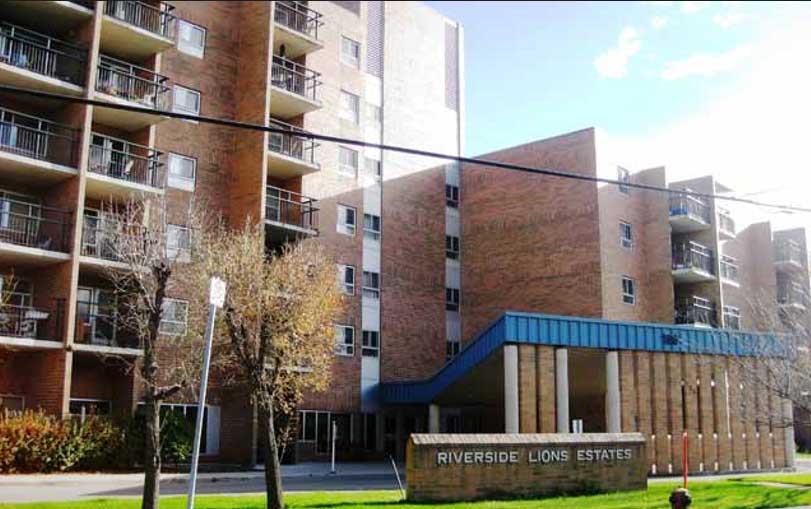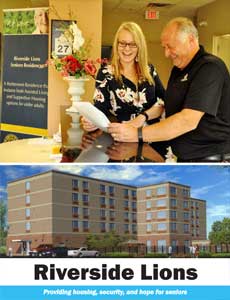Providing housing, security, and hope for seniors
Riverside Lions Estates and Riverside Lions Senior Residences are affordable, seniors housing facilities in the St. Vital area of Winnipeg, Manitoba, Canada. Both buildings were founded by the Riverside Lions Club, a 67-year member of Lions Club International, the world’s largest service organization, with more than 1.3 million members participating in 45,000 clubs, in over 200 countries.
Laura Devlin, is Riverside Lions’ Executive Director. She recounts how the two housing projects came into being: “The Riverside Lions Club incorporated in 1948, and from the start, the Club did a lot of work in the community, especially in regard to supporting schools, children, and families. And that continues till today. In the early 1980s, they began the process of planning and building a quality, affordable, barrier-free residence for both adult persons living with a disability and persons over 55 years of age. It became the first apartment building of its kind in Canada designed to provide adults living with a disability, incorporating a quality housing design and highly-affordable rents. Incorporated in 1982, and opening in  1984, Riverside Lions Estates very quickly filled all 130 apartments, and our waitlist built to a six-year wait, where it has essentially remained ever since.”
1984, Riverside Lions Estates very quickly filled all 130 apartments, and our waitlist built to a six-year wait, where it has essentially remained ever since.”
The Estates offers one, two, and three bedroom apartments for seniors, 55 and older, as well as for adults 21 years and up, who are living with a disability; 69 of its 130 barrier-free suites are wheelchair accessible; 90 percent of its tenants are elderly, while the other 10 percent are younger, adult individuals living with a physical or mental health-related disability. According to Devlin, “the building’s long wait list is due to the Lions Club’s long and distinguished reputation serving the community, its strong management, the well-maintained and aesthetically pleasing building, our quality, value-added services, and the fact that rents remain affordable.
“Given the lengthy wait list, increasingly driven by an aging demographic, the Board began to explore the possibility of building a new apartment block equipped with the capacity to provide a variety of additional services.” Devlin adds that, “beyond the growing demand for additional housing, the Board and management also recognized the importance and benefit of sustaining tenancy as both a good business practice and a way to maintain and enhance tenants’ quality of life. Tenants build relationships, amongst their cohort, and to their community, and sustaining those connections preserves health and well-being.”
Recognizing a growing area of service need and demand related to dementia and cognitive impairment, the Club sponsored its second housing project, in 2008 – the Riverside Lions Senior Residences Inc., specializing in early-stage dementia care. The building was constructed to provide quality, affordable housing and it incorporated a number of additional programs and services within both its structural and operational designs. Every detail of the building and its operations was planned to best serve the needs of persons living with dementia, including, for example, incorporating 22 percent more lighting, strategic color selection and contrasting, functional suite designs, a carefully developed management approach that supports tenant and front-line staff decision making, carefully selected business partners, environments that are easy to navigate, and décors that support autonomy, maximize independence, and support comfortable living. The new building features 48 supportive housing studio suites and 27 assisting living, one-bedroom apartments. The building also has a large commercial kitchen that serves tenants, staff, and community and business partners from both Riverside Lions Estates and Riverside Lions Seniors Residences.
“Supportive housing is by far the largest, most complex, area of operations,” says Devlin. “The program is a non-professionally based, non-medical program, with 24-hour, specifically trained, hand selected, and caring staff. It exists, essentially, to provide tenants with memory and cognitive impairment, holistic support and round-the-clock supervision with their activities of daily living – bathing, meals, housekeeping, medication reminders, and social and leisure activities.”
Devlin explains the assessment protocol for admission: “Initially, the applications for supportive housing come from the Winnipeg Regional Health Authority’s (WRHA). The WRHA funds the staffing component of the program with a particular purpose and need in mind – frail older adults who require 24-hour, non-medical support and supervision. The assessment involves a number of steps, including a variety of physical and medical tests by a physician and, in the case of supportive housing, family input and support for the application. These results are then collected along with other important information, and used to assist the WRHA with the task of determining each individual’s level of care, service, and housing needs. If the assessment supports an application be made to supportive housing, then the WRHA submits the application to the program of choice.
So, for example, if our site is chosen, the  WRHA will send the application to our leasing office and our leasing coordinator will review the application and contact the applicant, and his or her family, to discuss our programs, services and other variables and expectations in more detail. Our goal, from the start, is to make sure that all new tenants and their families are clear about what our program provides, and what it doesn’t provide, by establishing good and open communication pathways, and ultimately ensuring that expectations are clear and can be met.”
WRHA will send the application to our leasing office and our leasing coordinator will review the application and contact the applicant, and his or her family, to discuss our programs, services and other variables and expectations in more detail. Our goal, from the start, is to make sure that all new tenants and their families are clear about what our program provides, and what it doesn’t provide, by establishing good and open communication pathways, and ultimately ensuring that expectations are clear and can be met.”
Some of the main advantages of residing in the Residences include its lower rental costs in comparison to other facilities in the area, as well as the solid reputation of the Lions as a long-standing service Club within the community. Also important is the Residences’ specific and specialized focus on dementia care. “Everything we do,” says Devlin, “is designed for that purpose – our meal service, including our menu and the color of our plates, our leisure and social activities, even our management philosophy and human resource practices and policies. All are designed to support a healthy, nurturing, human environment, with particular focus on the needs of individuals with cognitive impairment.”
Devlin has used her prior training and experience with ecologically-based management approaches, such as the “Eden Alternative Philosophy” to lead the organization and its culture and policies. The community of wisdom and knowledge that has grown from the Eden Alternative is supported by much research, including evidence-based practice, and it fits with the organization’s corporate mission and culture. “We’ve informally incorporated many of the principles and philosophies of that program in our home and community. For example, we use a self-scheduling model, so staff is able to change shifts in their schedules – even last minute.
“We believe a culture of flexibility and choice between management and staff will result in a culture of flexibility and choice between tenants and staff. We honor staff’s work/life balance and have seen this translate, over and over again, into staff honoring the tenants’ life balance, preferences, and choices. So, for example, if a tenant doesn’t want a bath, or to wake up for breakfast, or doesn’t like what we are having for lunch, we honor that. We also keep staff working in the same areas; we don’t move them around, so that we do not sever ties and the comfort that comes from close and continuous relationships. In practical terms, therefore, the tenant rarely experiences the discomfort of new people bathing them and greatly reduces the need for tenants to have to introduce or explain their preferences, needs or values.”
In terms of future expansion, Devlin realizes that the future of non-profit housing will require economic diversification. “We know that there will be less public funding and this will require a greater reliance on diversifying our revenue base. We are exploring many options to ensure the resiliency and sustainability of our affordable housing programs well into the future. One current business model we are developing is a private seniors’ assistance and care service. We are in the very early stages of exploration and planning the new venture and our excitement continues to build as we realize the potential for this business to create many advantages for us and the clients we serve. As a for-profit venture, it has the potential to raise revenues and add value to our client base.
“We are also in the discussion stages of building a new personal care home. Taking such a step fits with our philosophy and practice of supporting tenants to remain in their existing communities (aging in place). We will continue to expand our intergenerational programs, as well. Currently we have a number of programs operating within our building that bring youth and seniors together, breaking the barriers of ageism, and imparting knowledge and the gained wisdom that come with time, along with the new skills and opportunities that come with new technologies.”
For the present, though, Devlin strikes a consistent note about her institution’s ongoing mission: “We serve people; we serve a life well-lived for our tenants and we serve hope,” she states. “And much of our heart and soul goes into turning that purpose into action and to creating a true home and community for our seniors; one that is affordable, diverse, collaborative, innovative and compassionate.”
AT A GLANCE
WHO: Riverside Lions
WHAT: Retirement and supportive housing facilities
WHERE: Winnipeg, Manitoba
WEBSITE: www.riversidelions.mb.ca
PREFERRED VENDORS

Tache Pharmacy – Tache Pharmacy has been providing effective pharmaceutical care, consultative services and pharmacy medication distributive services to people living in community-based and institutional care settings throughout the City of Winnipeg since 1974. Included among its client group are personal care homes, disease specific care homes, palliative care units, group and residential facilities, hospital wards, assisted and non-assisted living units, and emergency shelters. In addition to its pharmacy services, Tache Pharmacy also provides testing and nutritional services, and medical supplies. www.tachepharmacy.com

PFD Mechanical & Electrical – At PDF Mechanical & Electrical, we do residential, commercial and industrial work, ranging from changing receptacles, to bathtubs, to boiler and heating systems. Our goal is to create long-term relationships with our clients and provide them with 100 percent satisfaction all the time and every time. We work closely with our clients on their proposals and provide them with different options and cost-saving solutions.


